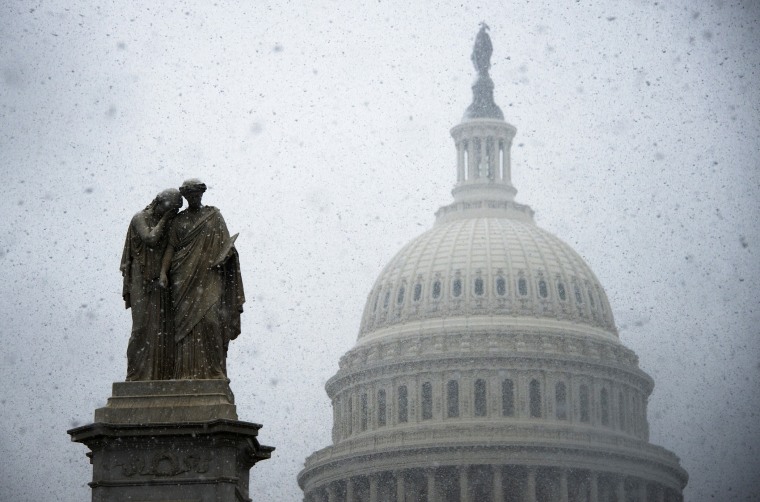Since the Republican victories in the 2010 midterms, Congress has become dysfunctional on a historic scale. Lawmakers have no meaningful legislative accomplishments since the Democratic majorities of 2010, and tasks that were once simple are now nearly impossible.
But since January 2011, Congress has excelled in one area: manufacturing avoidable crises. If there's one thing a GOP majority has guaranteed, it's that the nation's legislative branch will careen, over and over again, from one self-imposed crisis to the next.
* April 2011: House Republicans threaten a government shutdown unless Democrats accept GOP demands on spending cuts.
* July 2011: Republicans create the first-ever debt-ceiling crisis, threatening to default on the nation's debts unless Democrats accept GOP demands on spending cuts.
* September 2011: Republicans threaten another shutdown.
* April 2012: Republicans threaten another shutdown.
* December 2012: Republicans spend months refusing to negotiate in the lead up to the so-called "fiscal cliff."
* January 2013: Republicans raise the specter of another debt-ceiling crisis.
* September 2013: Republicans threaten another shutdown.
* October 2013: Republicans actually shut down the government.
* February 2014: Republicans raise the specter of another debt-ceiling crisis.
* December 2014: Republicans threaten another shutdown.
* February 2015: Republicans threaten a Department of Homeland Security shutdown.
I suspect for many Americans who only passively follow current events, the crisis cycle has become exasperating, and they're right -- great nations can't expect to function this way indefinitely. But it's important to realize this isn't just the result of historic differences between the two major political parties. Rather, it's the result of a deliberate approach to modern governance -- and it's quite new in historic terms.
Partisan bickering and gridlock are timeless, but there's never been an era in the American tradition in which the legislative branch of government stopped working on legislation and started creating one crisis after another, on purpose.
That is, until 2011.
It's not, however, an accident. Republicans came to a realization a few years ago that hostage-taking may be an effective approach to governance. They could, in theory, choose a priority -- spending cuts, taking away families' access to medical care, stripping immigrants of legal protections, etc. -- and draft legislation to advance their goals, but why bother? As GOP lawmakers quickly discovered, (a) writing and passing bills is hard work; (b) President Obama probably wouldn't sign partisan, far-right bills into law; and (c) Republicans weren't willing to compromise or accept concessions that would bring them closer to those goals incrementally.
So, they embraced a shortcut: GOP officials told Democrats to accept Republican priorities or Republicans would impose a hardship on the nation. GOP leaders and lawmakers assumed Dems would care too much about the real-world consequences of the Republican tactics, so Republicans could get what they want through radical and unprecedented brinkmanship -- legislating is hard; threatening is easy; so why invest energy in the former when the latter is largely effortless?
A new staple of GOP governance was born: hostage crises, all of a sudden, were a credible substitute for the traditional legislative process.
Historically, neither party dared governing this way for fear of a public backlash. But modern Republicans have no such concerns -- they assume the public won't know, won't care, and/or won't remember the extremism of these GOP tactics. And for the most part, their assumptions have been correct. (Look at the above list and you'll notice none of the crises came in the months immediately preceding an election. This, too, is not an accident.)
Americans may say they're tired of these tactics, but they're not, at least not tired enough to vote against those who keep taking hostages in exchange for unreasonable demands. The result, just two months into the new Congress, is a potential shutdown of the Department of Homeland Security this week, which will very likely be followed in the months to come with new crises surrounding the debt ceiling, the Highway Trust Fund, and in the fall, the federal budget.
To be sure, the GOP gambits started struggling when Democrats decided to stop paying ransoms. President Obama, for example, has said he will not negotiate with anyone threatening the nation with default. Republicans may huff and puff about blowing the economy down, but Dems tend to believe they're bluffing.
But these far-right habits won't fade anyway soon. Assuming the DHS standoff is resolved this week before a shutdown -- an outcome that is hardly assured -- the next hostage will be taken once again very soon.
Thanks to my colleague Rawan Jabaji for tracking down some of the above links.
